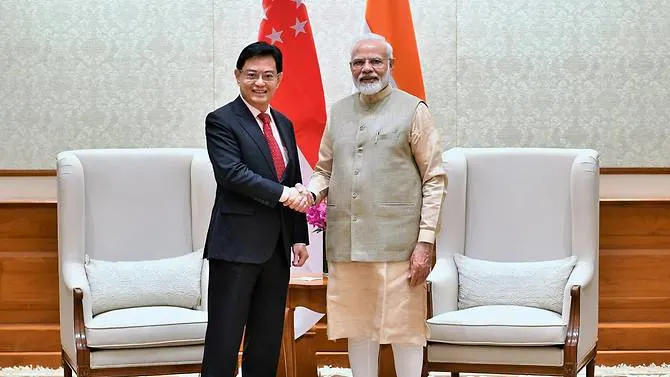Technology, tourism among areas of interest in strengthening Singapore-India ties: DPM Heng
05 October, 2019

Technology is one of the areas in which Singapore and India can work on together closely, Deputy Prime Minister Heng Swee Keat said on Friday (Oct 4).
Mr Heng was speaking to the media following his four-day visit to India, during which he met with Prime Minister Narendra Modi, Minister of Finance and Minister of Corporate Affairs Nirmala Sitharaman, and Minister of Railways and Minister of Commerce and Industry Piyush Goyal.
“I think the advances in the fourth industrial revolution, and in particular in the digital revolution, have very significant impact on many different industry sectors and spheres of activity,” he said.
“It’s very important for us to bring many partners together to look at how we can collaborate – to bring a partnership between governments, businesses and our people, and to see how we can ride on this new wave of change.”
Other areas of cooperation include defence and security, economic development, financial development and people-to-people exchange.
The deputy prime minister said his talks with Mr Modi touched on collaborations between South Asia and Southeast Asia, in addition to those between their two countries.
“There are many areas of complementarity between the two regions and both are working towards a development,” he said.
He added that it is even more important for South Asia and Southeast Asia to work together to “find new opportunities for collaboration” in the face of growing global uncertainty about economic conditions as well as the political situation.
They also discussed setting up task forces to look into the areas of interest, as well as to see how the two countries can “make progress in the coming months and years”.
Promoting better trade investments between the two regions, especially in infrastructure development and enhancing innovation, was discussed as well.
They also looked into promoting tourism development.
“By promoting the flow of people, we not only create more opportunities for collaboration for business leaders to meet one another and to explore new business models, but it also promotes deeper understanding between people in both regions.
"This is an important aspect of promoting more stable and peaceful global development,” Mr Heng said.
"IMPORTANT" FOR INDIA TO BE PART OF RCEP: DPM HENG
Mr Heng also spoke about the Regional Comprehensive Economic Partnership (RCEP) with Indian ministers during their meetings, he said, adding that he now has “a better understanding” of their concerns and wishes.
“I think it is important for India to be part of the RCEP because that will create a much bigger market and that will allow for greater integration. This way, we can create greater opportunities in the whole Asian region,” he said.
RCEP is a proposed free-trade agreement between ASEAN states and its six free trade agreement partners - China, Japan, India, South Korea, Australia and New Zealand. It is set to be the world’s largest economic bloc in the world, accounting for a third of global gross domestic product.
Talks for the agreement were officially launched in 2012, but have faced several delays.
RCEP is not meant to be a “close grouping”, Mr Heng said, but a way to help catalyse the multi-lateral trade system.
“I think we should build confidence in the benefits of free trade, in the benefits of deeper economic integration and in the process we also learn how to work together with one another, make many structural changes in our economy,” Mr Heng said.
“With the pace of technological development, and with the pace of change at the global level learning how we can make important structural adjustments and prepare our people for that will be key to further progress and development.”
